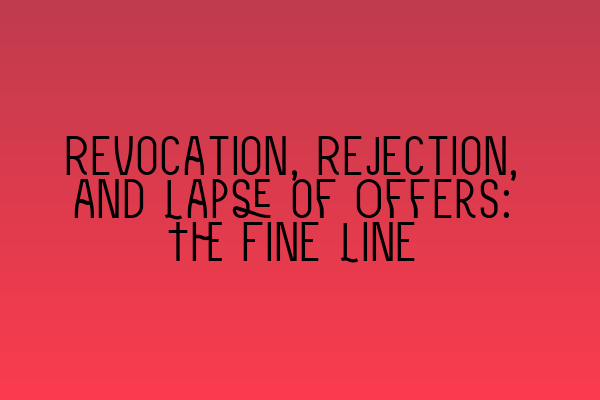Revocation, Rejection, and Lapse of Offers: The Fine Line
In contract law, the process of making and accepting offers is a crucial aspect. It sets the foundation for the formation of legal agreements and determines the rights and obligations of the parties involved. However, offers are not set in stone, and there are circumstances where they can be revoked, rejected, or simply lapse. Understanding the fine line between revocation, rejection, and lapse of offers is essential for both solicitors and individuals engaging in contractual negotiations.
Revocation of Offers:
Revocation refers to the act of withdrawing an offer before it is accepted. It is important to note that an offer can generally be revoked at any time before acceptance, unless it is under an option contract or other forms of irrevocable offers. Revocation can be communicated either directly to the offeree or through a reliable third party. The revocation is effective upon receipt by the offeree or when it is brought to their attention.
It is essential for solicitors and individuals to exercise caution when revoking an offer. Improper revocation or failure to communicate the revocation effectively may result in potential legal disputes. Legal professionals should ensure that any revocation is clear, unambiguous, and properly communicated to the offeree.
Rejection of Offers:
Rejection occurs when the offeree explicitly declines the offer made by the offeror. Once an offer has been rejected, it is terminated and no longer valid. Rejection can be communicated orally, in writing, or through conduct that is inconsistent with acceptance. It is important to note that rejection must be communicated to the offeror in order for it to be valid.
If a rejection is made, the offeror is no longer bound by the terms of the original offer. However, the offeror is free to make a revised offer or negotiate new terms if they choose to do so. Solicitors should advise their clients on the proper manner of rejecting an offer to avoid any potential misunderstandings or disputes.
Lapse of Offers:
Offers can also lapse due to the passage of time or other specified conditions. An offer may include a time limit for acceptance, and if the offeree fails to accept within that timeframe, the offer lapses. Similarly, if the offeror specifies certain conditions that must be met for the offer to remain open, the offer may lapse if those conditions are not fulfilled.
It is crucial for solicitors to thoroughly review the terms and conditions of offers to determine the potential for lapse. They should advise their clients on the importance of prompt acceptance and the necessity to meet any specified conditions within the designated timeframe.
Conclusion:
Understanding the nuances of revocation, rejection, and lapse of offers is vital in contract law. Solicitors must guide their clients through the complexities of contractual negotiations, ensuring that offers are made and accepted within the legal framework. By comprehending the fine line between revocation, rejection, and lapse, solicitors can protect their clients’ interests and prevent potential legal disputes.
To enhance your understanding of contract law and improve your preparation for the SQE exams, we recommend exploring the following articles:
1. SQE 1 Practice Exam Questions
2. SQE 1 Practice Mocks FLK1 FLK2
3. SQE 2 Preparation Courses
4. SQE 1 Preparation Courses
5. SRA SQE Exam Dates
By utilizing these resources, you can enhance your knowledge and improve your chances of success in the SQE exams. Remember, a solid understanding of contract law is essential for any aspiring solicitor, and continuous learning is key to staying at the forefront of this ever-evolving field.
